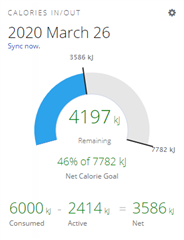It is not that simple.
Calories live very well in a lot of countries which have otherwise switched to SI units. Here in Denmark we are very much SI, but our food packagings still have nutrition information…
Yeah, when I lived in the UK and visited the doctor for the first time, they asked me for the weight, so I replied in kg (note: officially the UK uses the SI-system since the 80'ies). So they had no idea what it meant, reluctantly they asked "...in stones...?" - I thought it was a joke and asked "... yeah ... and pebbles!?"
In the end I learned that the UK still was stuck in the stone-age. - This can also be seen on their maps: using metres for elevations and distances in land-miles. (not even nautical ones, which would make sense, somehow) WTF?
But the US is no "inch"(=thumb-width) better - using a system which has no definitions, but is defined by the metric system (1 inch =25,4mm is the official definition!). It is so strange to see that they destroy satellites worth Giga-US-dollars or crash planes, because they cannot stick to a well defined and standardized set of simple decimal rules that do not require weird conversion factors like "the furlong ... is equal to one eighth of a mile, equivalent to 660 feet, 220 yards, 40 rods, 10 chains or approximately 201 meters". - On the other hand it is fun to see that the first thing ongoing scientists have to learn in the UK and US is the metric system. - I wonder whether this might be one reason for the success of foreigners in these countries.
Therefore, Garmin please forget about the kcal and abolish the mph and km/h* as well, to replace them by speeds humans can interpret like m/s - and make the local semi-standards only available for indigenous people as an option.
Thanks!
* using hours with 3600s is a strange remanescense of the Roman duodecimal system and thousands of seconds are hard to grasp for athletes anyway.
kcal (not "KCal") is not part of the metric system since 1948. It is a rather weird value for heating 1000g of water by 1°C (actually from 3.5 to 4.5°C at standard pressure).
Really weird... and while being at it, use m/s for speed, which is an international human-interpretable measure for velocity. (Rather than stones and pebbles)
I added kilojoules to Garmin Connect Web using GCOverrides:
